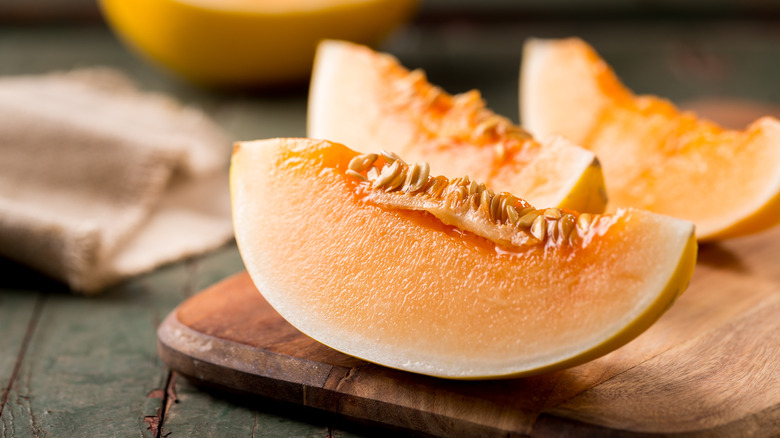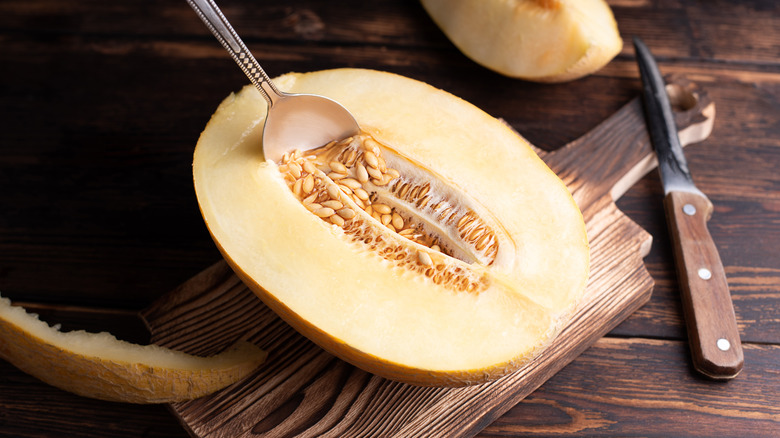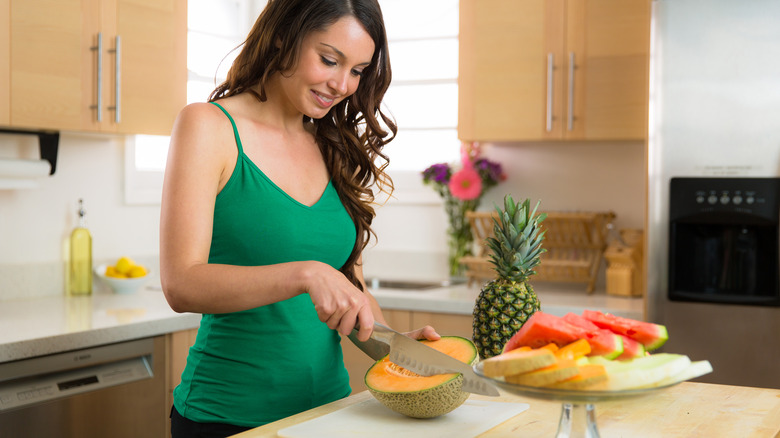The Reason You Should Stop Throwing Out Cantaloupe Seeds
Have you ever tried roasted pumpkin seeds? Then you should know that cantaloupe seeds have a similar flavor and texture. When roasted, they become crunchy and take on a nutty aroma with a hint of sweetness. Enjoy them as a snack or sprinkle them over salads, oatmeal, crackers, or homemade bread.
Cantaloupe seeds are higher in macronutrients than the actual fruit. For reference, cantaloupe melons have 1.5 grams of protein, 14.4 grams of carbs, and 0.3 grams of fat per cup. By comparison, a 3-ounce serving of cantaloupe seeds offers 20 grams of protein, 30 grams of carbs, and 50 grams of fat. They are also rich in flavonoids, tannins, polyphenols, and other antioxidants, according to a 2019 study published in the journal Foods.
As the researchers note, the antioxidants in cantaloupe seeds may protect against heart disease, cancer, and other illnesses. These health benefits are due to their ability to reduce oxidative stress. On top of that, cantaloupe seeds are perfect as a pick-me-up snack because of their high carb content.
Cantaloupe seeds are a nutritional powerhouse
One of the things you should know before attempting to cut a cantaloupe is that you shouldn't discard the peel and seeds. Both contain high doses of antioxidants and bioactive compounds, such as catechins, ortho-diphenols, gallic acid, quercetin, and kaempferol. These nutrients exhibit antiviral, anticancer, anti-inflammatory, and cardioprotective effects, notes the journal Foods.
For example, ferulic acid supports liver health and may prevent blood clot formation, among other benefits. Kaempferol, on the other hand, may suppress tumor growth and induce cancer cell death. At the same time, it fights inflammation and may help prevent chronic diseases, according to 2014 research presented in Food Chemistry. Cantaloupe seeds are also rich in quercetin, a flavonoid that may protect against atherosclerosis, reduce blood pressure, and improve blood lipids. Its anti-cancer properties are well documented, too.
These tiny seeds may also lower your risk of diabetes and ulcers, suggests a 2022 study featured in the International Journal of Creative Research Thoughts. Scientists believe that certain compounds in cantaloupe seeds inhibit two enzymes linked to diabetes and its complications. Additionally, the seeds contain omega-6s, omega-9s, and other unsaturated fats that support optimal health. For instance, omega-6 fatty acids may lower bad cholesterol, increase good cholesterol, and improve insulin sensitivity. They also exhibit anti-inflammatory effects and may reduce the risk of cardiovascular events.
How to reap the benefits of cantaloupe seeds
Raw cantaloupe seeds taste bland, but you can roast them to bring out their flavor and reap the benefits. First, rinse them to remove excess pulp. Pat them dry, and then mix them with sea salt, paprika, garlic powder, and other spices in a bowl. You can also add a drizzle of olive oil for extra flavor. Meanwhile, preheat your oven to 325 degrees Fahrenheit. Line a baking pan with parchment paper, place the seeds inside, and roast them for 10 to 15 minutes, or until golden brown. Once cooled, serve them as a snack or store them in an airtight container.
If you have a sweet tooth, mix the seeds with brown sugar, cinnamon, and a pinch of salt before roasting them in the oven. Alternatively, combine them with watermelon or pumpkin seeds, coconut flakes, chopped nuts, dried fruit, cinnamon, and vanilla extract. Bake the mixture and enjoy it for breakfast or whenever you need an energy boost.
Roasted cantaloupe seeds can also be an excellent addition to stews, breakfast cereals, rice dishes, and smoothie bowls. For example, you can mix them into pilafs or quinoa bowls or sprinkle them over ice cream and fruit tarts. Another option is to use them as a substitute for other seeds or nuts in baked goods, such as multigrain bread, crackers, or pretzels. When you're short on time, blend the raw seeds into fruit smoothies to boost your antioxidant intake.


